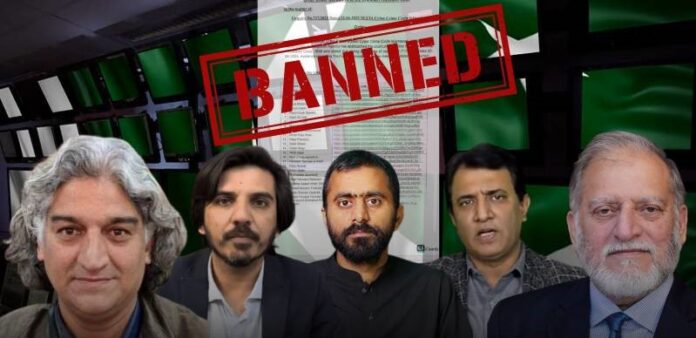A local court in Islamabad has ordered the immediate blocking of 27 YouTube channels, including those run by prominent journalists and political commentators, over allegations of spreading anti-state content and violating Pakistan’s cybercrime laws.
Judicial Magistrate Abbas Shah issued the order on Tuesday after reviewing a petition filed by the Federal Investigation Agency’s (FIA) Cyber Crime Wing. The FIA launched an inquiry on 2 June and submitted what the court termed “satisfactory” evidence showing that the channels were publishing inflammatory and derogatory material targeting state institutions.
Among the individuals named in the order are well-known journalists such as Matiullah Jan, Asad Toor, Siddique Jan, Orya Maqbool Jan, and Habib Akram. Several of the channels are also affiliated with the opposition Pakistan Tehreek-e-Insaf (PTI) party.

The FIA claimed that the channels were engaged in disseminating “disinformation, fake news, and content insulting towards the military, judiciary, and other state institutions,” which it argued posed a risk to public order and national security. The court concurred, ruling that the material may amount to punishable offences under the Pakistan Penal Code (PPC) and the Prevention of Electronic Crimes Act (PECA).
“The content published is highly inflammatory, derogatory, and incites hatred against the army, judiciary, and other state institutions,” read the FIA’s petition. The order added that such material threatens social cohesion and could erode public trust in national institutions.
The court directed Google LLC’s regional office in Pakistan to block the listed channels and remove access to any videos or streams found to be in violation of PECA and relevant laws. The directive was issued under Section 94 of the Criminal Procedure Code (CrPC).
Threat Of CRIMINAL Charges
Pakistan’s State Minister for Interior Talal Chaudhry said the content creators would also face criminal charges.

The move follows earlier actions by the Pakistan Telecommunication Authority (PTA), which in May blocked 16 YouTube news channels, 31 specific video links, and 32 websites on allegations of disseminating anti-state propaganda. According to the PTA, the targeted platforms were accused of spreading “misleading and harmful narratives” aimed at undermining national unity and manipulating public opinion.
This latest wave of restrictions coincides with the implementation of the Prevention of Electronic Crimes (Amendment) Act 2025, enacted in January despite widespread opposition from journalist unions, civil society organizations, and opposition political parties. The amended law expands the definition of “false information,” accelerates content takedown procedures, and introduces new regulatory and investigative frameworks.
The Human Rights Commission of Pakistan (HRCP) has strongly criticized the amendment, warning that it may pave the way for coercive enforcement and censorship under the pretext of national security. Critics argue that the court-ordered bans reflect a broader pattern of digital repression aimed at silencing dissent and stifling freedom of expression. Media watchdogs have raised alarm over the opaque nature of the decision-making process and the resulting chilling effect on independent journalism in Pakistan.















































